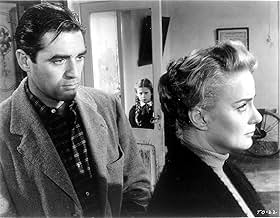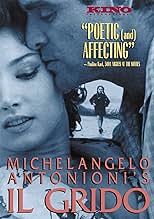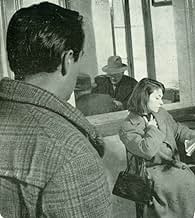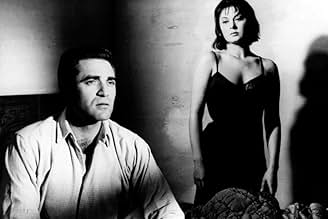NOTE IMDb
7,6/10
5,8 k
MA NOTE
Ajouter une intrigue dans votre langueA man wanders aimlessly away from his town, away from the woman he loves, emotionally and socially inactive.A man wanders aimlessly away from his town, away from the woman he loves, emotionally and socially inactive.A man wanders aimlessly away from his town, away from the woman he loves, emotionally and socially inactive.
- Réalisation
- Scénario
- Casting principal
- Récompenses
- 3 victoires et 2 nominations au total
Gabriella Pallotta
- Edera, her sister
- (as Gabriella Pallotti)
Jacqueline Jones
- Andreina
- (as Lyn Shaw)
Pietro Corvelatti
- Fisherman
- (non crédité)
Elli Parvo
- Donna Matilda
- (non crédité)
Avis à la une
Other reviews to the contrary, if you found Le Notte or L'Eclisse lacked sufficient plot, I doubt you'll enjoy Il Grido. However, unlike later Antonioni, the focus here is not on fear of commitment & loss of passion, but on a classic spurned lover. Like L'Eclisse, Il Grido begins with breakup, magnificently acted & powerfully filmed; we feel each shudder of pain. In fact, both films' power rests on us sharing this experience, second by second, nerve-end by nerve-end. Note Irma's efforts to hold to the fabric of order & routine to keep a lid on Aldo's fury & the careful portrayal of Aldo's frustrations.
Il Grido's opening builds to a very public & final breakup. It initiates Aldo's journey away from Irma & home. I kept thinking of Schubert's song cycle, Winterreise. In both, after rejection the protagonist's world ceases to hold together. Only here the descent isn't into winter but into fog, industrial sprawl, & ever more spartan existence. Even the piano which accompanies Aldo reminded me of lieder.
The opening's not quite picturesque scenery may suggest nurturing home values. Unlike couples in other Antonioni classics, Aldo & Irma have a daughter, & to Aldo their lives seemed fulfilled. The almost picturesque is soon replaced by encroaching industrial sounds & images. Several times we see trees felled as an old order is being swept away. At film's end, the whole town is slated for demolition, & we are asked to contemplate the relation between the Winterreise-like main text of lost love & this subtext of industrial sprawl & oppressive, intrusive government. No clear connection is given, but as in later Antonioni, the images work their effect as much on our subconscious as on our intellect; whether we can verbalize our thoughts or not, we feel this rupture with earlier values & social structures. For me, Il Grido is a more honest film than L'Avventura. If it lacks a bit of the elegant, refined photo compositions of Antonioni's trilogy, it rests on the same detailed, carefully structured cinematography.
Il Grido's opening builds to a very public & final breakup. It initiates Aldo's journey away from Irma & home. I kept thinking of Schubert's song cycle, Winterreise. In both, after rejection the protagonist's world ceases to hold together. Only here the descent isn't into winter but into fog, industrial sprawl, & ever more spartan existence. Even the piano which accompanies Aldo reminded me of lieder.
The opening's not quite picturesque scenery may suggest nurturing home values. Unlike couples in other Antonioni classics, Aldo & Irma have a daughter, & to Aldo their lives seemed fulfilled. The almost picturesque is soon replaced by encroaching industrial sounds & images. Several times we see trees felled as an old order is being swept away. At film's end, the whole town is slated for demolition, & we are asked to contemplate the relation between the Winterreise-like main text of lost love & this subtext of industrial sprawl & oppressive, intrusive government. No clear connection is given, but as in later Antonioni, the images work their effect as much on our subconscious as on our intellect; whether we can verbalize our thoughts or not, we feel this rupture with earlier values & social structures. For me, Il Grido is a more honest film than L'Avventura. If it lacks a bit of the elegant, refined photo compositions of Antonioni's trilogy, it rests on the same detailed, carefully structured cinematography.
In the total of Antonioni's films, 'Il grido' (= Italian for 'the outcry') makes an exception: it is entirely set in a worker's environment. Usually Antonioni's actors and actresses perform people who don't earn their living by physical labor.
Produced shortly before Antonioni's famous trio 'La Notte', 'L'eclisse' and 'L'avventura', this film from 1957 clearly shows the theme Antonioni got so famous with: men losing their roots, being dislocated & disoriented by the advancement of technology. Around 1960 this pessimism was very current.
On top of this, 'Il grido' carries every other Antonioni-feature. Fine shooting, while emphasizing on geometries in buildings and landscapes (Antonioni was educated as an architect). First class actors and actresses who seldom laugh and make joy. And, as I already mentioned, a pessimistic theme linked with some grand-scale technical advancement.
Antonioni is renowned as 'the poet of misery'; 'Il grido' is quite in line with this statement.
Produced shortly before Antonioni's famous trio 'La Notte', 'L'eclisse' and 'L'avventura', this film from 1957 clearly shows the theme Antonioni got so famous with: men losing their roots, being dislocated & disoriented by the advancement of technology. Around 1960 this pessimism was very current.
On top of this, 'Il grido' carries every other Antonioni-feature. Fine shooting, while emphasizing on geometries in buildings and landscapes (Antonioni was educated as an architect). First class actors and actresses who seldom laugh and make joy. And, as I already mentioned, a pessimistic theme linked with some grand-scale technical advancement.
Antonioni is renowned as 'the poet of misery'; 'Il grido' is quite in line with this statement.
Antonioni is one of the sages of cinema, perhaps the wisest of them. His cinema is a stunning edifice; a structure rigid and harmonious as shaped by a visual vocabulary which articulates with few words a place and a time; pattern and blueprint, whereby each film as individual level informs and is informed by the whole; these levels filled with doors to insight and intuition. To all these doors he holds the keys, and in the spaces behind the doors, which are closed to most filmmakers, he moves freely and sees everything. Meditation as stillness of mind, which enables awareness.
Naturally some of these levels are more aptly functional, staircases that lead higher. Il Grido is one of those (and La Notte later).
Nonetheless we see here the early sketches of what is to come. We see a man cast adrift after a painful breakup as passing through various lives, affecting them with shortlived passions and vexations. Each of these lives he briefly shares could be a possible new home, a safe harbor where peace and happiness are finally possible. But he moves on, still clinging to a mad hope and frustrated desire that his old affair could resume at any point.
So this is the fascinating stuff. A man alone, itinerant, ostensibly free to be what he may, but captive of his desires so that he's nothing at all, except perhaps a painful memory. The downward spiral into squalor and misery is not simply the upkeep of a bad karma, but a reminder of what fuels the restlessnesss. What negativity keeps him going, regret or unfulfillment, will only be encountered ahead of him, it cannot be escaped by running from it.
In passing through these phases the film perhaps stalls for too long. We understand what is going on, the proverbial journey of an empty, unfulfilled life, but Antonioni wants to shape these lives as lived, meaning we get the mundane details of their routine. The comings and goings and side characters, as vignettes. This is the neorealist baggage ostensibly cinema in the service of revealing/documenting society, which Antonioni is about to shed for his next film, and be free as a creative spirit.
For the end Antonioni reserves defeaning symbolism, by contrast to the hazy allusions he would favour onwards. The man climbs on the refinery tower, the place and time where he was for once happy in his life and which now seems impossible to attain again, and we don't even have to guess what happens next.
Naturally some of these levels are more aptly functional, staircases that lead higher. Il Grido is one of those (and La Notte later).
Nonetheless we see here the early sketches of what is to come. We see a man cast adrift after a painful breakup as passing through various lives, affecting them with shortlived passions and vexations. Each of these lives he briefly shares could be a possible new home, a safe harbor where peace and happiness are finally possible. But he moves on, still clinging to a mad hope and frustrated desire that his old affair could resume at any point.
So this is the fascinating stuff. A man alone, itinerant, ostensibly free to be what he may, but captive of his desires so that he's nothing at all, except perhaps a painful memory. The downward spiral into squalor and misery is not simply the upkeep of a bad karma, but a reminder of what fuels the restlessnesss. What negativity keeps him going, regret or unfulfillment, will only be encountered ahead of him, it cannot be escaped by running from it.
In passing through these phases the film perhaps stalls for too long. We understand what is going on, the proverbial journey of an empty, unfulfilled life, but Antonioni wants to shape these lives as lived, meaning we get the mundane details of their routine. The comings and goings and side characters, as vignettes. This is the neorealist baggage ostensibly cinema in the service of revealing/documenting society, which Antonioni is about to shed for his next film, and be free as a creative spirit.
For the end Antonioni reserves defeaning symbolism, by contrast to the hazy allusions he would favour onwards. The man climbs on the refinery tower, the place and time where he was for once happy in his life and which now seems impossible to attain again, and we don't even have to guess what happens next.
In the Antonioni canon "Il Grido" is often cited as one of his lesser works, superseded by the trilogy that began with "L'Avventura" and even his later English-language films, "Blow Up" and "The Passenger". Granted this remarkable film doesn't quite hit you between the eyes in the way others do but remarkable it is, a grim tale of working-class misery set in a misty, wet Po Valley and concerned, like much of Antonioni's work, with a loss or lack of love.
Perhaps the critics of the time weren't too happy with Antonioni's decision to cast the American Steve Cochran as the brutish anti-hero Aldo. Cochran had to be dubbed as did a number of his co-stars, including Alida Valli and Betsy Blair. In his own country Cochran was never rated as much of an actor but he is superb here as a man deserted by the woman he had hoped to marry, (Valli), and who then takes to the road with his young daughter.
If anything, the film is proof that Antonioni wasn't just a great chronicler of upper and middle-class angst but someone who could deal with the universal themes of loss and grief. It's certainly downbeat. From the outset it's a film that offers no hope for its characters and is probably the director's most pessimistic work. His use of location is, of course, crucial; its bleakness mirrors its characters lack of hope and Cochran's Aldo is one of cinema's great existentialist working-class heroes while, even dubbed as here, both Valli and Blair are excellent and Gianni Di Venanzo's cinematography is superb. This is a film crying out for rediscovery and simply shouldn't be missed.
Perhaps the critics of the time weren't too happy with Antonioni's decision to cast the American Steve Cochran as the brutish anti-hero Aldo. Cochran had to be dubbed as did a number of his co-stars, including Alida Valli and Betsy Blair. In his own country Cochran was never rated as much of an actor but he is superb here as a man deserted by the woman he had hoped to marry, (Valli), and who then takes to the road with his young daughter.
If anything, the film is proof that Antonioni wasn't just a great chronicler of upper and middle-class angst but someone who could deal with the universal themes of loss and grief. It's certainly downbeat. From the outset it's a film that offers no hope for its characters and is probably the director's most pessimistic work. His use of location is, of course, crucial; its bleakness mirrors its characters lack of hope and Cochran's Aldo is one of cinema's great existentialist working-class heroes while, even dubbed as here, both Valli and Blair are excellent and Gianni Di Venanzo's cinematography is superb. This is a film crying out for rediscovery and simply shouldn't be missed.
After living seven years with the mechanic Aldo (Steve Cochran), having a daughter with him, the simple woman Irma (Alida Valli) is informed that her absent husband had just died in Sydney. She becomes upset when Aldo proposes to marry her and she tells him that she is going to leave him. Unable to explain how much he loves her, Aldo takes their daughter Rosina (Mirna Girardi) and travels with her, meeting different women in different places, trying to establish a new relationship and fill the emptiness of his sentimental life. He visits his former lover Elvia (Betsy Blair); he meets and lives with the widow Virginia (Dorian Gray), who owns a gas station; he lives with the prostitute Andreina (Lynn Shaw). But these relationships never complete the needy Aldo.
Michelangelo Antoniani is the filmmaker of the troubled relationships and "Il Grido" is a depressive story of a worker seeking a woman to fulfill the emptiness of his sentimental life after his seven year mate breaks their marriage. Without possessions, he needs to work to survive with his daughter while trying to live with another woman, in a sad and tragic story. My vote is eight.
Title (Brazil): "O Grito" ("The Cry")
Michelangelo Antoniani is the filmmaker of the troubled relationships and "Il Grido" is a depressive story of a worker seeking a woman to fulfill the emptiness of his sentimental life after his seven year mate breaks their marriage. Without possessions, he needs to work to survive with his daughter while trying to live with another woman, in a sad and tragic story. My vote is eight.
Title (Brazil): "O Grito" ("The Cry")
Le saviez-vous
- AnecdotesMichelangelo Antonioni's first collaboration with his future muse and lover, Monica Vitti. Although Vitti doesn't physically appear in the film, she dubbed the Italian lines for Dorian Gray.
- GaffesToutes les informations contiennent des spoilers
- ConnexionsFeatured in Cinéma Paradiso (1988)
Meilleurs choix
Connectez-vous pour évaluer et suivre la liste de favoris afin de recevoir des recommandations personnalisées
- How long is Il Grido?Alimenté par Alexa
Détails
Box-office
- Montant brut aux États-Unis et au Canada
- 16 549 $US
- Week-end de sortie aux États-Unis et au Canada
- 6 536 $US
- 10 nov. 2024
- Montant brut mondial
- 17 413 $US
- Durée
- 1h 56min(116 min)
- Couleur
Contribuer à cette page
Suggérer une modification ou ajouter du contenu manquant



























